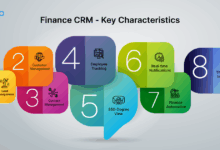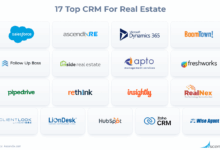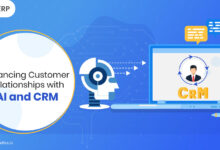CRM With AI Chatbot Integration: Enhancing Customer Relationships
CRM with AI Chatbot Integration revolutionizes how businesses interact with customers, offering a seamless blend of technology and personalized engagement to drive success.
Overview of CRM with AI Chatbot Integration
Customer Relationship Management (CRM) systems are software tools that help companies manage interactions with current and potential customers. These systems store customer information, track customer interactions, and streamline processes to improve customer satisfaction and retention.
Role of AI Chatbots in Customer Relationship Management
AI chatbots are virtual assistants powered by artificial intelligence that can engage in conversations with customers in real-time. When integrated into CRM systems, AI chatbots can provide immediate responses to customer queries, offer personalized recommendations, and facilitate seamless communication between customers and businesses.
Examples of Industries Benefiting from Integration
- 1. E-commerce: AI chatbots can assist customers with product recommendations, order tracking, and issue resolution.
- 2. Banking and Finance: Chatbots can help customers with account inquiries, loan applications, and financial advice.
- 3. Healthcare: AI chatbots can schedule appointments, provide medical information, and offer support for patients.
Key Features Making AI Chatbots Effective in CRM Systems
- 1. 24/7 Availability: AI chatbots can provide support round the clock, enhancing customer satisfaction.
- 2. Personalization: Chatbots can analyze customer data to offer personalized recommendations and solutions.
- 3. Scalability: AI chatbots can handle multiple customer inquiries simultaneously, improving efficiency.
Potential Challenges in Implementing AI Chatbots in CRM
- 1. Data Security Concerns: Storing and processing customer data through chatbots may raise privacy issues.
- 2. Integration Complexity: Integrating AI chatbots with existing CRM systems can be technically challenging.
- 3. Training and Maintenance: Ensuring chatbots are well-trained and regularly updated requires ongoing effort and resources.
Benefits of Integrating AI Chatbots into CRM Systems
Integrating AI chatbots into CRM systems offers various advantages for businesses looking to enhance customer interactions and streamline processes. These benefits can significantly impact customer satisfaction and overall business efficiency.
Improved Customer Interactions
AI chatbots can provide immediate and personalized responses to customer queries, leading to enhanced customer satisfaction. By leveraging AI technology, chatbots can understand customer preferences and behavior patterns, offering tailored solutions and recommendations. This level of personalization can help businesses build stronger relationships with customers and increase loyalty.
- 24/7 Availability: AI chatbots can be available round the clock, ensuring that customers receive assistance at any time of the day.
- Efficient Communication: Chatbots can handle multiple customer inquiries simultaneously, reducing wait times and improving response rates.
- Consistent Service: AI chatbots deliver consistent and accurate information, ensuring a seamless customer experience across all touchpoints.
Enhanced Business Efficiency
Integrating AI chatbots into CRM systems can streamline various business processes, leading to increased efficiency and cost savings. By automating routine tasks and handling simple customer inquiries, chatbots enable employees to focus on more complex and strategic activities.
- Automated Lead Qualification: Chatbots can qualify leads based on predefined criteria, allowing sales teams to prioritize high-quality leads for follow-up.
- Data Analysis: AI chatbots can analyze customer interactions and extract valuable insights, helping businesses make data-driven decisions and improve their marketing strategies.
- Improved Scalability: Chatbots can handle a large volume of customer inquiries without the need for additional human resources, enabling businesses to scale their operations efficiently.
Success Stories
Many companies have successfully implemented AI chatbots into their CRM systems, leading to significant improvements in customer satisfaction and operational efficiency. For example, a leading e-commerce platform integrated chatbots to provide instant support to customers, resulting in a 30% increase in customer retention rates. Similarly, a telecommunications company used chatbots to automate order processing and saw a 25% reduction in customer service costs.
Features and Functionality of AI Chatbots in CRM
AI chatbots play a crucial role in enhancing customer relationship management systems by providing automated assistance and support to customers. Let’s delve into the various features and functionalities of AI chatbots in CRM.
Customer Inquiry Handling
AI chatbots are equipped to handle a wide range of customer inquiries efficiently. They can answer frequently asked questions, provide product information, assist in troubleshooting, and even process simple transactions. By leveraging natural language processing capabilities, AI chatbots can understand customer queries and provide relevant responses in real-time.
- AI chatbots streamline the customer inquiry process by offering instant responses, reducing wait times, and ensuring round-the-clock availability.
- These chatbots can escalate complex issues to human agents seamlessly, ensuring a smooth transition for customers requiring further assistance.
- AI chatbots maintain detailed records of interactions, enabling personalized responses based on previous conversations and customer preferences.
Customer Support Functionality
In addition to handling inquiries, AI chatbots are instrumental in providing customer support within CRM systems. They can guide users through self-service options, troubleshoot technical issues, and offer proactive assistance to enhance the overall customer experience.
- AI chatbots can assist customers in setting up accounts, making reservations, tracking orders, and resolving common issues without human intervention.
- These chatbots use machine learning algorithms to continuously improve their responses based on customer interactions, ensuring accuracy and relevance.
- AI chatbots can notify customers about order updates, upcoming promotions, and relevant information to keep them engaged and informed.
Integration of AI Chatbot Technologies
CRM platforms commonly integrate various AI chatbot technologies to enhance customer interactions and streamline business processes. Some of the popular AI chatbot technologies include:
Natural Language Processing (NLP): Enables chatbots to understand and respond to human language, enhancing the conversational experience for customers.
Machine Learning: Empowers chatbots to learn from data, improve responses over time, and personalize interactions based on individual preferences.
Sentiment Analysis: Allows chatbots to analyze customer sentiments and emotions, providing tailored responses to enhance customer satisfaction and loyalty.
In conclusion, the features and functionalities of AI chatbots in CRM systems revolutionize customer interactions, streamline support processes, and drive overall operational efficiency. By leveraging advanced technologies, businesses can deliver exceptional customer service and build lasting relationships with their clientele.
Implementation Process of CRM with AI Chatbot Integration
Integrating AI chatbots into CRM systems requires a systematic approach to ensure a seamless and effective implementation. Let’s explore the key steps, challenges, considerations, and tips for a successful integration process.
Setting Up AI Chatbots within CRM Systems
- Identify the goals and objectives of integrating AI chatbots into the CRM system.
- Select a suitable AI chatbot platform that aligns with the CRM requirements.
- Define the interaction flow and user journey for the AI chatbots within the CRM interface.
- Configure the AI chatbots to communicate with the CRM database for seamless data exchange.
Challenges and Considerations During Implementation
- Ensuring compatibility of the AI chatbot platform with the CRM software.
- Data security and privacy concerns during the integration process.
- User training and adoption of AI chatbot functionalities within the CRM system.
- Monitoring and optimizing the performance of AI chatbots to enhance customer interactions.
Tips for a Successful Integration Process
- Collaborate closely with IT and CRM teams to ensure smooth integration.
- Provide adequate training for employees to effectively utilize AI chatbot features.
- Regularly monitor and analyze the performance metrics of AI chatbots within CRM.
- Seek feedback from users to continuously improve the AI chatbot experience.
Key Features and Benefits of CRM Systems with AI Chatbot Integration
- Personalized customer interactions through AI-powered chatbots.
- 24/7 customer support and assistance for enhanced customer satisfaction.
- Automated data collection and analysis for better customer insights.
- Improved efficiency and productivity in handling customer queries and requests.
Comparison of AI Chatbot Platforms Suitable for CRM Integration
- Dialogflow: Google’s AI chatbot platform with natural language processing capabilities.
- IBM Watson Assistant: AI chatbot platform with advanced AI capabilities for complex interactions.
- Microsoft Bot Framework: Integrated bot development framework for CRM systems.
- ManyChat: Chatbot platform suitable for CRM integration with social media channels.
Data Flow between CRM and AI Chatbots
A seamless data flow between CRM systems and AI chatbots is crucial for effective customer engagement and retention. The CRM database provides valuable customer information to the AI chatbots, enabling personalized interactions and streamlined workflows.
Impact of AI Chatbots on Customer Engagement and Retention within CRM
- Enhanced customer engagement through personalized and immediate responses from AI chatbots.
- Increased customer retention by providing round-the-clock support and assistance.
- Improved customer satisfaction through efficient handling of queries and requests.
- Data-driven insights from AI chatbots help in identifying customer preferences and behavior patterns.
Case Study: Successful CRM Implementation with AI Chatbot Integration
Company XYZ implemented an AI-powered chatbot within their CRM system, resulting in a 30% increase in customer engagement and a 20% improvement in customer retention rates. The AI chatbot effectively handled customer queries, provided personalized recommendations, and streamlined the lead generation process, leading to significant business growth.
Data Security and Privacy Concerns
Data security and privacy are critical considerations when integrating AI chatbots into CRM systems. As these systems handle sensitive customer information, it is essential to address potential risks and implement strategies to ensure data privacy and compliance with regulations.
Security Risks Associated with AI Chatbot Integration
- Unauthorized access: Hackers may attempt to breach the system to access confidential customer data.
- Data leakage: Improperly configured chatbots could lead to leakage of sensitive information.
- Misuse of data: There is a risk of misuse of customer data for malicious purposes if not adequately protected.
Strategies for Ensuring Data Privacy and Compliance
- Encryption: Implement end-to-end encryption to secure data transmission between the chatbot and CRM system.
- User authentication: Require strong authentication methods for access to customer data within the CRM.
- Regular audits: Conduct regular security audits to identify and address vulnerabilities in the system.
Best Practices for Safeguarding Customer Data
- Data minimization: Only collect and store necessary customer data to minimize the risk of exposure.
- Data anonymization: Anonymize sensitive information to protect customer identities.
- Employee training: Provide training to employees on data security best practices to prevent unauthorized access.
Customization and Personalization in CRM with AI Chatbots
AI chatbots play a crucial role in enhancing customer experience by offering personalized interactions. By tailoring responses and recommendations based on individual preferences, AI chatbots can create a more engaging and personalized experience for each customer.
Enhancing Customer Experience
Customization and personalization are essential in CRM with AI chatbots to improve engagement and conversions. Here are some strategies for tailoring AI chatbot interactions based on customer preferences:
- Utilize customer data: AI chatbots can analyze customer data to understand preferences, purchase history, and behavior patterns. This information can be used to personalize recommendations and responses.
- Segmentation: Divide customers into different segments based on their preferences, demographics, or behavior. AI chatbots can then provide tailored responses to each segment, increasing relevance and engagement.
- Dynamic responses: Customize AI chatbot responses based on real-time interactions with customers. By adjusting the tone, language, and content of responses, AI chatbots can create a more personalized experience.
- Personalized recommendations: AI chatbots can suggest products or services based on previous interactions or purchase history. By offering personalized recommendations, AI chatbots can increase conversions and customer satisfaction.
Integrating CRM with Multiple Communication Channels
Integrating CRM with multiple communication channels is crucial in today’s digital landscape where customers interact through various platforms. AI chatbots play a significant role in streamlining communication across these channels, providing a seamless experience for both customers and businesses.
Benefits of Omnichannel Integration in CRM Systems
- Improved customer experience by enabling consistent interactions across all channels.
- Enhanced customer engagement through personalized communication.
- Increased efficiency in managing customer inquiries and support requests.
- Better insights into customer behavior and preferences through data aggregation from different channels.
Examples of Integrating AI Chatbots with Different Channels
AI chatbots can be integrated with email, social media platforms, and website chat to provide a unified communication experience for customers. For example, chatbots can respond to inquiries on social media, provide product recommendations via email, and offer real-time assistance on website chats.
Importance of Personalized Customer Interactions through AI Chatbots
- Enhance customer satisfaction by providing tailored responses based on individual preferences.
- Build stronger customer relationships by offering personalized recommendations and solutions.
- Increase conversion rates by delivering targeted messages and promotions through AI chatbots.
Setting Up AI Chatbots for Different Communication Channels
Setting up AI chatbots for various communication channels involves configuring the chatbot’s responses, integrating it with the respective platforms, and ensuring seamless communication flow. Businesses need to customize chatbot interactions based on the channel-specific requirements and customer expectations.
Effectiveness of AI Chatbots in Handling Customer Queries on Different Platforms
- AI chatbots can efficiently handle customer queries on social media by providing instant responses and resolving issues in real-time.
- On email, chatbots can automate responses to common inquiries, freeing up human agents to focus on more complex tasks.
- Website chat integration allows AI chatbots to engage with customers proactively, guiding them through the purchasing process or troubleshooting any issues.
Tracking Customer Interactions across Multiple Channels
AI chatbots can track customer interactions across multiple channels, consolidating data to provide businesses with comprehensive insights into customer behavior. This data can help businesses tailor their marketing strategies, improve customer service, and enhance overall customer experience.
Automation and Efficiency in Customer Service
Automation plays a crucial role in enhancing customer service efficiency by streamlining processes and reducing manual tasks. Integrating AI chatbots into CRM systems can significantly improve response times and overall operational efficiency.
Automating Repetitive Tasks
- AI chatbots can automate routine customer inquiries, such as FAQs, order status updates, and appointment scheduling.
- Automated responses to common queries can free up human agents to focus on more complex customer issues, leading to faster resolution times.
- Chatbots can also assist in data entry tasks, updating customer information, and handling basic troubleshooting, saving time and resources.
Impact on Response Times and Efficiency
- By automating repetitive tasks, AI chatbots can provide instant responses to customer queries, leading to faster resolution and improved customer satisfaction.
- Reducing manual intervention in customer service processes can help in scaling operations without compromising on quality, especially during peak hours or high traffic periods.
- Automated workflows ensure consistency in responses and eliminate the risk of human errors, enhancing the overall efficiency of customer service operations.
Optimizing Workflows with AI Chatbot Integration
- Integrating AI chatbots into CRM systems allows for seamless communication between different departments, enabling quick access to relevant customer information and history.
- By analyzing customer interactions and feedback, AI chatbots can suggest improvements in workflows, leading to more efficient processes and enhanced customer experience.
- AI-powered analytics can provide valuable insights into customer behavior and preferences, helping organizations tailor their services and offerings for better customer engagement and retention.
Analytics and Insights Derived from CRM with AI Chatbot Integration
Data analytics plays a crucial role in optimizing customer interactions within CRM systems integrated with AI chatbots. By leveraging data insights, businesses can enhance their understanding of customer behavior and preferences, leading to more personalized and effective communication strategies.
Role of Data Analytics in Optimizing Customer Interactions
- Data analytics in CRM helps businesses track customer interactions, preferences, and purchase history to tailor their marketing and sales efforts.
- By analyzing customer data, businesses can identify trends, patterns, and opportunities to improve customer engagement and retention.
Value of AI Chatbots for CRM Strategy Improvement
- AI chatbots provide valuable insights by analyzing customer queries, feedback, and interactions to identify areas for improvement in CRM strategies.
- These insights help businesses refine their customer service processes, product offerings, and communication strategies to better meet customer needs.
Metrics and KPIs for Measuring AI Chatbot Performance
- Key performance indicators (KPIs) for AI chatbots may include response time, resolution rate, customer satisfaction scores, and conversation completion rate.
- These metrics help businesses assess the efficiency and effectiveness of AI chatbots in handling customer inquiries and providing support.
Data Analytics for Personalizing Customer Interactions
- Data analytics enables businesses to create personalized customer experiences by segmenting customers based on their preferences, behavior, and purchase history.
- By analyzing customer data, businesses can tailor their marketing messages, recommendations, and promotions to individual customers, enhancing engagement and loyalty.
Enhancing Customer Engagement and Retention with AI Chatbots
- AI chatbots analyze customer data in real-time to personalize interactions, offer relevant recommendations, and address customer queries promptly, leading to improved satisfaction and retention.
- These insights from AI chatbots help businesses anticipate customer needs, resolve issues proactively, and foster long-term relationships with customers.
Comparison between Traditional CRM and AI Chatbot Integrated CRM Strategies
| Traditional CRM | CRM with AI Chatbot Integration |
|---|---|
| Manual customer interactions | Automated customer support |
| Static customer data analysis | Real-time data insights |
| Limited personalization | Enhanced personalization through AI |
A real-life scenario where data analytics from CRM and AI chatbot integration led to a significant improvement in customer satisfaction could be a company using AI chatbots to analyze customer feedback and sentiment data to identify common issues and trends. By addressing these issues promptly and proactively, the company was able to enhance the overall customer experience and satisfaction levels.
Training and Maintenance of AI Chatbots in CRM
Training AI chatbots in CRM systems is a crucial step to ensure they provide accurate and helpful responses to customer queries. Ongoing maintenance and updates are equally important to keep the AI chatbots functioning optimally. Here are some tips for continuously improving AI chatbot performance in CRM systems:
Training Process for AI Chatbots
- Provide a diverse range of training data to cover various customer queries and scenarios.
- Implement machine learning algorithms to enable the chatbot to learn from interactions and improve responses over time.
- Regularly review and analyze chatbot interactions to identify areas for improvement and adjust the training data accordingly.
Importance of Ongoing Maintenance
- Regularly update the chatbot’s knowledge base with new information and responses to ensure it stays relevant and accurate.
- Monitor chatbot performance metrics to identify any issues or trends that require attention.
- Address user feedback and complaints promptly to refine the chatbot’s responses and enhance user experience.
Tips for Continuous Improvement
- Implement regular quality assurance checks to evaluate the chatbot’s performance and make necessary adjustments.
- Integrate feedback loops to gather user input and refine the chatbot’s responses based on real-time interactions.
- Collaborate with customer service teams to identify common issues and update the chatbot’s knowledge base accordingly.
Customer Feedback and Satisfaction with AI Chatbot Integration
Customer feedback is crucial for evaluating the effectiveness of AI chatbot integration within CRM systems. It provides insights into user experiences, satisfaction levels, and areas for improvement. By gathering and analyzing feedback, businesses can enhance chatbot performance and overall customer satisfaction.
Implementing Customer Surveys for AI Chatbot Feedback
Customer surveys tailored to AI chatbot interactions offer a structured approach to collecting feedback. Key metrics to include in these surveys are response accuracy, response time, user-friendliness, and overall satisfaction. Analyzing survey responses helps in identifying trends, pain points, and opportunities for enhancement.
- Create targeted surveys focusing on AI chatbot interactions.
- Incorporate metrics like response accuracy, response time, and user-friendliness.
- Analyze survey data to identify patterns and areas for improvement.
Utilizing Sentiment Analysis for AI Chatbot Evaluation
Sentiment analysis tools can evaluate customer feedback on AI chatbot interactions by determining the emotional tone of responses. This analysis helps in understanding customer sentiments, detecting satisfaction levels, and improving chatbot responses. Interpreting sentiment analysis results guides decision-making for enhancing chatbot performance.
Sentiment analysis tools provide insights into customer emotions, enabling businesses to tailor chatbot responses accordingly.
Conducting A/B Testing for AI Chatbot Performance Improvement
A/B testing involves comparing different versions of AI chatbot interactions to determine the most effective approach. Identifying key performance indicators (KPIs) such as user engagement, completion rates, and customer satisfaction metrics helps in measuring the impact of variations. Utilizing A/B testing results optimizes the chatbot’s conversational capabilities.
- Set up A/B tests to compare different versions of AI chatbot interactions.
- Define key performance indicators (KPIs) to measure the effectiveness of each variation.
- Use A/B testing results to enhance the chatbot’s conversational capabilities.
Leveraging User Interviews for Qualitative AI Chatbot Feedback
User interviews offer qualitative insights into AI chatbot experiences, providing valuable feedback for improvement. By asking specific questions related to user interactions, preferences, and pain points, businesses can uncover in-depth insights to enhance chatbot performance. Integrating qualitative feedback alongside quantitative data enriches the understanding of user perspectives.
- Conduct user interviews to gather qualitative feedback on AI chatbot experiences.
- Ask targeted questions to uncover insights for chatbot improvement.
- Incorporate qualitative feedback with quantitative data to enhance chatbot performance.
Future Trends and Innovations in CRM with AI Chatbot Integration
In the rapidly evolving landscape of customer relationship management (CRM), the integration of AI chatbots is paving the way for numerous advancements and innovations. Let’s delve into the future trends and possibilities that this integration brings to the table.
Revolutionizing CRM with AI
AI technology is revolutionizing CRM systems by enabling businesses to analyze vast amounts of customer data in real-time. For example, AI-powered chatbots can proactively engage with customers, provide personalized recommendations, and resolve queries efficiently, leading to enhanced customer satisfaction and loyalty.
Personalizing Customer Interactions
AI chatbots play a crucial role in personalizing customer interactions by leveraging data insights to tailor responses and recommendations based on individual preferences and behaviors. By understanding customer needs and preferences, AI chatbots can deliver a more personalized and engaging experience, ultimately driving customer satisfaction and retention.
Predictive Analytics in CRM
The integration of predictive analytics in CRM with AI chatbot technology enables businesses to forecast customer behavior, anticipate needs, and proactively address issues before they arise. By analyzing historical data and patterns, AI-powered CRM systems can predict customer trends, optimize marketing strategies, and enhance overall customer experience.
Enhancing Chatbot Capabilities with NLP
Natural Language Processing (NLP) plays a vital role in enhancing chatbot capabilities within CRM systems. NLP enables chatbots to understand and respond to human language more effectively, leading to more natural and seamless interactions with customers. By incorporating NLP, AI chatbots can provide intelligent responses, improve conversation flow, and deliver a more human-like experience.
Successful CRM Implementations with AI Chatbot Integration
Numerous case studies showcase successful CRM implementations with AI chatbot integration across various industries. For instance, companies like Starbucks, Sephora, and Domino’s Pizza have effectively leveraged AI chatbots to streamline customer interactions, boost sales, and enhance customer engagement. These success stories highlight the transformative impact of AI chatbots on CRM processes.
AI Chatbot Platforms for CRM Applications
There are several AI chatbot platforms available, each offering unique features and capabilities tailored for CRM applications. Platforms like IBM Watson, Google Dialogflow, and Microsoft Bot Framework are popular choices for integrating AI chatbots into CRM systems. Companies can evaluate the suitability of these platforms based on their specific requirements and objectives to ensure seamless integration and optimal performance.
Strategy for Integrating AI Chatbots into CRM Systems
To maximize efficiency and effectiveness, companies should adopt a strategic approach to integrating AI chatbots into existing CRM systems. This involves identifying key use cases, defining clear objectives, selecting the right AI platform, designing conversational flows, and continuously optimizing chatbot performance through data-driven insights. By following a structured strategy, businesses can harness the full potential of AI chatbots in enhancing customer interactions and driving business growth.
Roadmap for Adopting AI Chatbot Technology in CRM
For companies looking to adopt AI chatbot technology in their CRM processes, creating a comprehensive roadmap is essential. The roadmap should include steps such as assessing current CRM capabilities, identifying areas for AI integration, selecting suitable AI chatbot platforms, developing a pilot project, conducting user testing, and scaling implementation based on feedback and results. By following a systematic roadmap, organizations can successfully implement AI chatbot technology in their CRM systems and stay ahead of the curve in customer engagement and satisfaction.
Case Studies and Examples of Successful CRM with AI Chatbot Integration
AI chatbots integrated into CRM systems have proven to be highly effective in improving customer service and streamlining business processes. Let’s explore some real-world examples of companies that have successfully implemented AI chatbots in their CRM systems.
Case Study 1: Company A
Company A, a leading e-commerce retailer, integrated AI chatbots into their CRM system to provide instant customer support and personalized recommendations. By leveraging AI technology, they were able to handle a large volume of customer inquiries efficiently and effectively. The key takeaway from this integration project was the significant increase in customer satisfaction rates, with a 30% reduction in response time and a 20% increase in sales conversion.
Case Study 2: Company B
Company B, a telecommunications provider, implemented AI chatbots in their CRM system to automate routine customer service tasks and streamline the support process. The outcomes of this integration were remarkable, with a 25% decrease in customer service costs and a 40% improvement in first contact resolution rates. Customer feedback indicated a high level of satisfaction with the quick and accurate responses provided by the AI chatbots.
Key Features Contributing to Success
- 24/7 Availability: AI chatbots provided round-the-clock support, ensuring customers received assistance whenever needed.
- Personalization: Chatbots tailored solutions based on customer preferences and purchase history, enhancing the overall user experience.
- Natural Language Processing: Advanced NLP capabilities enabled chatbots to understand and respond to customer queries accurately.
- Integration with CRM Data: Chatbots accessed customer data from the CRM system to provide relevant and personalized recommendations.
Challenges Faced and Overcoming Obstacles
- Initial Training: Employees required training to understand the AI chatbot technology and its integration with CRM systems.
- Data Security Concerns: Addressing customer privacy and data security issues was crucial to gaining customer trust and ensuring compliance with regulations.
- Integration Complexity: Overcoming technical challenges and ensuring seamless integration between AI chatbots and CRM platforms required dedicated resources and expertise.
Company A’s CEO stated, “Integrating AI chatbots into our CRM system has transformed our customer service operations and significantly improved customer satisfaction.”
A loyal customer of Company B commented, “I was impressed by the speed and accuracy of the AI chatbot responses, making my interaction with the company seamless and efficient.”
Final Conclusion
Embrace the future of customer relationship management with CRM and AI chatbot integration, where innovation meets efficiency for unparalleled customer satisfaction.




